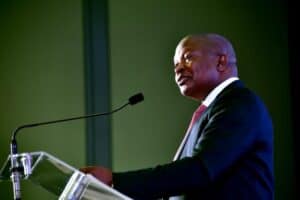Mabuza has only himself to blame, given the perception he had neglected his state duties, says Dr Ralph Mathekga.

ANC deputy president David Mabuza’s political baggage, his regular absence from duty and the push for younger leaders could be reasons for his exclusion from the current succession debate, say experts.
Political economy analyst Daniel Silke said there was a view within the party that the ANC needed high-profile charismatic younger leaders who carried little baggage.
Despite being the incumbent, Mabuza’s name had not featured yet in the intensifying race for the ANC deputy president position, with the party’s national conference scheduled for December.
Instead, an increasing number of members had their names thrown into the hat for the second-most powerful position in the party.
Mabuza still has to indicate whether he would be available for re-election as the race for a position in the top six, particularly president and deputy president, grows more intense.
Whose fault is it?
Political analyst Dr Ralph Mathekga said Mabuza had only himself to blame, given the perception he had neglected his state duties, given his regular absences.
The official opposition in parliament questioned Mabuza about his long leave of absence, when he apparently underwent several surgeries in Russia and was often unavailable to answer questions as one of the heads of government.
Mathekga said Mabuza had become ANC deputy president “through a strange twist of events leading to Nasrec [2017], almost an accidental deputy”.
“He is being challenged. Also, he has been struggling in that position – poor showing in parliament to answer questions; long medical leave to Russia – and all this shows a nearly vacant position that everyone wants,” Mathekga said.
ANC December conference
The governing party is expected to hold its 55th national conference in December when, in addition to adopting policies, it will elect a new leadership.
Since Polokwane in 2007, ANC elections have been mired by intense infighting and factional dominance. The deputy presidency attracted fierce competition.
The first to put his foot forward for the position was Justice and Correctional Services Minister Ronald Lamola, followed recently by Minister of Human Settlements Mmamoloko Kubayi.
The latest to raise his hand to join the race was ANC treasurer-general Paul Mashatile. Silke said the trio had a lot going for them, especially regarding the ANC renewal and revival.
With the party out to find younger more dynamic leadership, “Mabuza has become largely, I would regard, expendable in this particular battle”.
“Mabuza derived his position from the period Ramaphosa needed his support and I think that period is over. “Moreover, I think Mabuza doesn’t have the same political clout for the coalition to support Ramaphosa in future.
His own personal backing or the provincial backing he once had is not there any more – largely,” Silke said.
Silke was referring to the newly elected Mpumalanga provincial leadership, which backed Ramaphosa and seemed to distance themselves from Mabuza.
Besides Mabuza’s health issues, his age and the generation change needed were factors which mitigated against him.
“For all these various reasons plus, of course, the overall view is the ANC needs very high-profile leaders who are young, charismatic and don’t have too much baggage.
“That’s pretty much why those three names are up there, particularly Mashatile from an electability and being dynamic point of view, he is the more attractive deputy president candidate,” Silke said.
ALSO READ: Plenty of reasons why Mabuza isn’t the right man to replace Cyril, say experts






